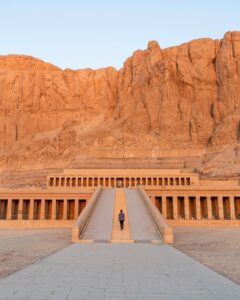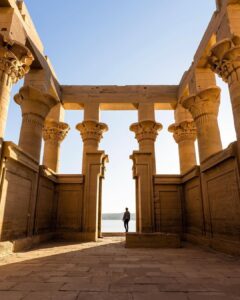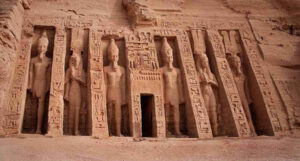History: Tracing the Legacy
The ancient Library of Alexandria, established in the 3rd century BC by Ptolemy I Soter, stood as a symbol of intellectual enlightenment. Home to scholars and philosophers from across the globe, it housed a vast repository of scrolls and books encompassing diverse fields like mathematics, astronomy, philosophy, and medicine. Despite its monumental significance, the library met a tragic end when it succumbed to fire in 48 BC, resulting in the loss of invaluable knowledge.
Fast forward to the 21st century, and the Bibliotheca Alexandrina emerges as a phoenix from the ashes of its ancient predecessor. Inaugurated in 2002, this modern marvel aims to revive the spirit of the ancient library, serving as a beacon of knowledge and cultural exchange.
The BA Today: A Hub of Learning and Innovation
With a collection exceeding 8 million books, manuscripts, and multimedia materials, the Bibliotheca Alexandrina stands as one of the largest libraries in the world. Beyond its vast archives, the BA offers a plethora of educational and cultural programs tailored to visitors of all ages. From interactive exhibitions to scholarly symposiums, the library fosters an environment of learning and discovery.
Differences Between Ancient and Modern Libraries
While the ancient Library of Alexandria was predominantly a repository of physical scrolls and books, the Bibliotheca Alexandrina embraces modernity with its diverse range of resources. From electronic databases to interactive multimedia, the BA caters to the evolving needs of researchers and scholars in the digital age. Moreover, unlike its ancient predecessor, the modern library is equipped with advanced fire prevention measures, ensuring the preservation of knowledge for future generations.
Visiting the BA: A Journey Through Time
Open seven days a week from 9:00 am to 8:00 pm, the Bibliotheca Alexandrina welcomes visitors from around the world to explore its treasures. Admission is free, allowing guests to immerse themselves in the library’s collections, attend captivating exhibitions, and engage in scholarly pursuits. Whether you’re a history enthusiast, a culture aficionado, or a curious traveler, a visit to the BA promises an enriching experience like no other.
Conclusion: Embracing the Legacy
In conclusion, the Bibliotheca Alexandrina stands as a testament to humanity’s enduring quest for knowledge and enlightenment. From its ancient origins to its modern incarnation, the library continues to inspire generations with its wealth of resources and commitment to intellectual discourse. Whether you’re delving into the past or embracing the future, the BA remains a beacon of knowledge for all who seek to expand their horizons.
FAQs
Is admission to the Bibliotheca Alexandrina free? Yes, admission to the BA is free for all visitors, allowing unrestricted access to its collections and facilities.
What are some highlights of the BA’s educational programs? The BA offers a diverse range of educational programs, including lectures, workshops, and cultural events, catering to learners of all ages and interests.
Can researchers access digital resources at the Bibliotheca Alexandrina? Absolutely! The BA provides researchers with access to an extensive array of digital resources, including online databases and multimedia archives.
Are guided tours available at the Bibliotheca Alexandrina? Yes, visitors can opt for guided tours of the BA, led by knowledgeable staff who offer insights into the library’s history, architecture, and collections.
Does the Bibliotheca Alexandrina host international events? Indeed, the BA serves as a hub for international conferences, seminars, and cultural exchanges, fostering collaboration and dialogue among scholars worldwide.
How does the Bibliotheca Alexandrina contribute to local and global communities? The BA plays a vital role in promoting literacy, education, and cultural exchange, enriching both local communities and the global academic landscape.













